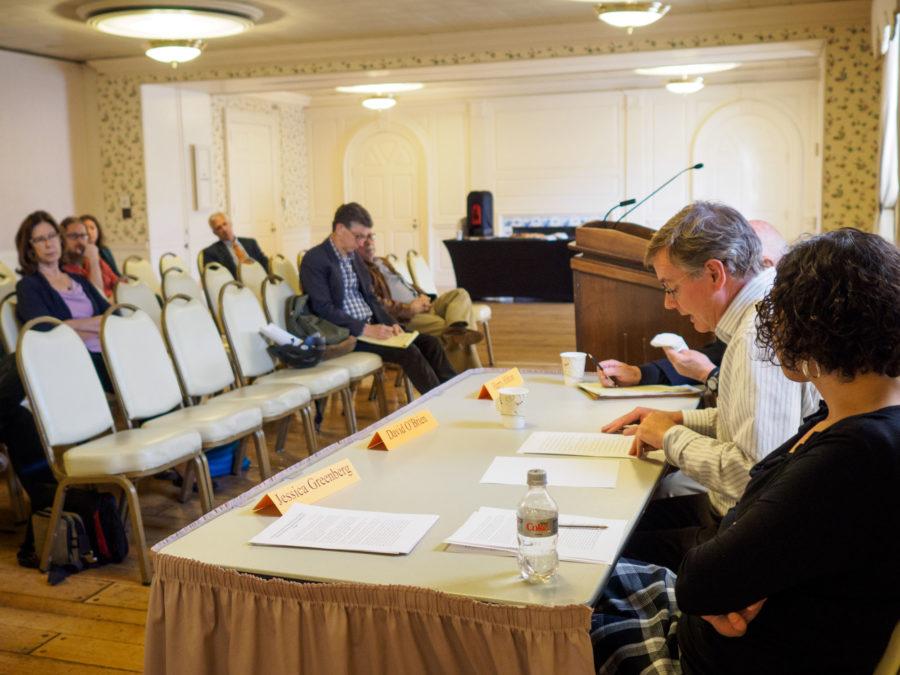UI AAUP chapter discusses censure in open panel
Ryan Fang The Daily Illini David O’Brien, Art History chair, speaks at the AAUP meeting on Tuesday, October 20.
Oct 20, 2015
Last updated on May 5, 2016 at 08:23 p.m.
The Champaign-Urbana chapter of the American Association of University Professors, AAUP, held a panel headed by chapter President Harry Hilton on Tuesday addressing the University’s AAUP censure and the implementation of background checks on prospective faculty applicants.
One of the panelists, David O’Brien, associate professor of art history, detailed the steps the University would have to take to be removed from the AAUP’s censure list.
“The AAUP only goes through three steps in order to remove an institution from its censure list. They check the policies that had led to censure had been revised, they check if the agreed faculty members have received regress, and they send someone to the University to verify that conditions there merit the lifting of censure,” O’Brien said.
But to be removed from the censure list, he said the University must admit wrongdoing in its handling of Steven Salaita’s hiring.
Get The Daily Illini in your inbox!
“First, the chancellor, president and trustees must withdraw statement justifying the decision not to appoint Salaita as the relevant standard of conduct,” O’Brien said. “Second, Professor Salaita must either be reinstated to the position he was offered or he must be offered a legal settlement that the AAUP accepts as adequate compensation for the wrongs done to him. So either reinstatement, or a settlement.”
Salaita filed a federal lawsuit against the University on Jan. 29, seeking reinstatement and monetary compensation.
Jessica Greenberg, panelist and associate professor of anthropology, discussed background checks and said there are too many questions about how the policy would be implemented.
“As it’s currently formulated there is absolutely no way to ensure a fair implementation of this policy, let alone in a timely manner,” Greenberg said. “It creates a highly discretionary approach to life-changing employment decisions with impact not only on potential employees but academic units involved in hiring.”
She also raised concerns about the possibility of discrimination involved in the background check policy.
“Discrimination and racial bias would be written into our hiring procedures if we implement this policy. Applicants of color are statistically more likely to have faced arrest, conviction and imprisonment for criminal offenses,” Greenberg said. “Many of our colleagues already feel the weight of the day-to-day criminalization of the people of color in this country.”
She said faculty from abroad may be discouraged by the background check policy.
“I have no idea how a search committee or academic HR would begin to access, let alone assess, the criminal background of people coming from a very different political and legal context,” Greenberg said. “International applicants will be wary of criminal background checks that represent surveillance and a lack of trust in faculty.”
Additionally, she said the fact that the background check policy was implemented without much faculty input is also concerning.
“Rushing implementation at this point is not only the administratively irresponsible thing to do for our institution, it also violates the voices of the majority of our faculty senate. Many people with a lot of expertise have objected to this policy and have called for a thorough review,” Greenberg said. “I think this, in and of itself, is a community that privileges and respects that that kind of knowledge and expertise is enough to be wary.”






